 |
|
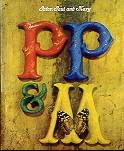
Peter, Paul & Mary
1963 TOUR PROGRAM

Meet Peter, Paul and Mary,
in performance, in recording sessions, and
off-stage, a barber shop, a classroom and a snow fight.
Now meet three individuals
named Peter Yarrow, Paul Stookey and
Mary Allin Travers who met only a few years ago.
Meet them shopping, painting, reading or being alone.
This book will introduce you to them all.
But most of all meet
Peter, Paul and Mary,
that fourth entity created by the three of them
and different from each, in music and in person.

Peter
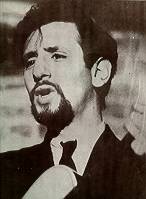 Someone
who grows up in New York City becomes aware at a very early age of the
limitations of a person alone. The world revolves around him at an incredible
pace... but takes little notice. Almost immediately he questions the meaning
of his existence. He is drawn to situations and people that he hopes will
affirm his importance, or at least testify to the fact that he belongs.
I wanted both to belong and to be important. In any given group one must
find out what is valued and then possess it, be it an ability, an object,
or an hereditary characteristic. Assuming that one is capable of possessing
these things at will, the problems arise only when one's values are at
variance of those of the group. In my case, this particular conflict has
shaped my life. Someone
who grows up in New York City becomes aware at a very early age of the
limitations of a person alone. The world revolves around him at an incredible
pace... but takes little notice. Almost immediately he questions the meaning
of his existence. He is drawn to situations and people that he hopes will
affirm his importance, or at least testify to the fact that he belongs.
I wanted both to belong and to be important. In any given group one must
find out what is valued and then possess it, be it an ability, an object,
or an hereditary characteristic. Assuming that one is capable of possessing
these things at will, the problems arise only when one's values are at
variance of those of the group. In my case, this particular conflict has
shaped my life.
I attended Public School No. 6 (at 85th Street and Madison)
in Manhattan. Most of the students were from wealthy Jewish homes, and
had been overindulged in material things since their birth. Unfortunately,
they had learned at an early age that their parents' attention could quickly
be diverted from them to the vicissitudes of the stock market. (These were
the early post-war years and many fortunes had been amassed at the expense
of a happy family.) I approached my classmates with the same openness and
trust that I had experienced at home. Unfortunately, few of them spoke
the same language.
In P.S. No. 6 status in the group was achieved through
possessions. One had to be well-dressed and have a yo-yo or a bullwhip
when it was the "fad." I tried to obtain recognition by excelling in the
classroom. The unfortunate reaction of the teachers to that type of behavior
was compounded by their becoming particularly fond of me. Consequently,
I worked hard in the afterschool hours trying to convince myself and my
friends that I was really a very clever fellow who was putting on a big
act in school just to fool the teachers (the eternal enemy, the "grown
up"). I think my happiest moments were spent at home painting paper plates
and making model airplanes.
During the summer of my seventh year, I painted
everyday in Woodstock, an art colony in upper New York State. It was there
that an artist named Sigmund Menkes bought one of my paintings. I was told
that his comment when he first saw the picture was, "The audacity of the
child!" I did not know it then but I was to study painting with him eight
years later. During the summer of my eighth year the family went to Chatauqua,
a Protestant music colony where I studied the violin, attended a concert
every night and ruled the roads with my bicycle. If only life in Manhattan
could have been that simple and rewarding.
My life changed abruptly when
I was graduated from grammar school. I was to be permitted the luxury of
having four years during which everything I valued was similarly valued
by everyone around me. In the High School of Music and Art, the castle,
all the students were gifted in either painting or music. M and A was an
adolescent's Shangrila, a unique wedding of his social, academic and creative
lives. In my third semester I ran for secretary of the Student Governing
Body. I didn't have a chance until I got up on stage to give my election
speech. I was wearing a red corduroy shirt, (my fellow candidates were
dressed in business suits) and I promised to put mirrors in the boys' washrooms.
I not only won by a landslide, but discovered that I was a performer. To
this day I remember that first feeling of real communication with a large
audience.
An M & A Saturday night party deserves special mention. In
one room a string quartet was "reading" a Vivaldi concerto. In another
everyone sat on the floor trading monumental truths and responding with
agonized gasps to conflicting monumental truths. In a third room there
was folk singing. All the art students (I was one) played the guitar and
everyone knew all the songs. They were beautiful songs of freedom and hope,
and often, in the last hours of the party, we would weep together in out
awakening to the knowledge of a man's love for his brother.
In the fall
of 1955, I entered Cornell University as a prospective physics major, with
the intention of going to graduate school in the design area. the very
first day I began to wage a terrible battle both with the school and inside
myself. The Cornell campus was magnificent and the course of study was
both difficult and exhilarating. But the students themselves challenged
the way of life I had learned to love. Of course, there were all types
of people there, but the fraternity system ruled and the social mores were
completely alien to me. I would never have tried to conform if I had had
the courage of my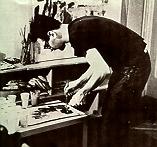 convictions.
But the students I knew were very bright and I began to believe that maybe
they were right. Maybe M & A had been a fantasy world and I was a dreamer.
I discovered some people who felt as I did inside, and they became my friends.
But in a large group, we all played the part. convictions.
But the students I knew were very bright and I began to believe that maybe
they were right. Maybe M & A had been a fantasy world and I was a dreamer.
I discovered some people who felt as I did inside, and they became my friends.
But in a large group, we all played the part.
I joined a fraternity and,
to tell the truth, I loved the people in it, but the idea of an exclusive
society was wrong, I felt. I could never reconcile myself to seeing the "rushees'" hurt faces when they were rejected because they were less malleable
than I. I found I could not paint. My work was technically good but devoid
of any feeling I could recognize as my own. I had played the role so often
I had begun to believe it myself. Peculiarly enough, I discovered that
I could still find myself in singing. And to my amazement, everyone considered
this a valuable attribute.
In my senior year I was offered an undergraduate
assistantship in English 355-356, a course in the history of folk stories
and songs. The renowned Dr. Harold Thompson taught the course, and it was
through this man's erudition that I became aware of the historic import
as well as the emotional power of folk music. The course was popularly
called "Romp'n Stomp" and auditing it soon became the thing to do. I was
a senior at this time and had changed to a psychology major. I had also
become the President of the folksong club and had produced Cornell's first
series of folk concerts. At one concert, the plane carrying Josh White
was delayed, and I performed for an hour, holding the audience until he
arrived. Josh's kind compliments to me afterward provoked my first consideration
of a professional career in folk music.
When I was graduated from Cornell
in September, 1959, I needed a rest from the academic world. I fully intended
to enter a school of design a year later and, in the interim, to try to
earn money by singing. My first engagement was at an Israeli coffee house
in New York. I had simply walked in and told the owner that he would make
more money if someone sang there. It was the same thing I had done at a
place called Johnny's Big Red Grill while I was still at Cornell. In both
cases the remark had been unprecedented, and both owner's decided to give
it a try. Once a week I played for $15.00 and all the food I could eat.
A month later Eliezor Adoram, a very talented Israeli singer and accordionist,
asked me to join the Aviv Theater of Dance and Song, for which he was musical
director. I toured with them for three weeks in the Midwest. The members
of the Aviv were dedicated artists. More than that, they were pros, and
they imbued in me an exacting standard of performance. They taught me to
work with other performers and to respect the profession I was becoming
a part of.
After that tour I decided to perform alone and managed to get
a job at the newly opened "Cafe Wha?" in Greenwich Village. It was there
that Albert Grossman first saw me. In a real sense, my break came when
I was asked to perform on the first television folk spectacular, "Folk
Sound U.S.A." in June, 1960. Also on that program were Joan Baez, John
Lee Hooker, Cisco Houston, Frank Warner, John Jacob Niles and Earl Scruggs
and the Foggy Mountain Boys. After that I performed at the Newport Folk
Festival, the Gate of Horn in Chicago and the Ash Grove in L.A.
All this
time I had been working under the aegis of Albert Grossman, and when I
returned to New York he discussed with me the possibility of forming a
group. He introduced me to Mary, who had already been singing with Paul.
I wrote the arrangement for "This Train" which the first song we did. Then
we worked out the parts to "Cruel War," and it became our second song.
Gradually we all began to believe we might have something to say together.
It appears that I have at least in part resolved the conflict of which
I spoke. For I do now belong, I do exist and I do have some importance.
And I have these things in a world that does not force me to compromise
my values and beliefs in any way. I have many people to thank for this.
Especially Paul and Mary, who have helped me to achieve these things in
the performing world. Our managers, Albert Grossman and John Court have
helped me to criticize my singing on it's own terms rather than according
to audience reaction. There is my family that became the one constant reference
during these periods when the world became completely confusing. In a way
I am glad these conflicts existed, for without the ability to sense the
world around me, without the desire to evaluate it for myself, and without
the capacity for caring about what I saw, I would never have been able
to sing folk songs.

Paul
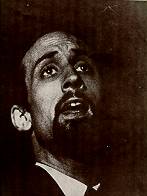 My dad says
that once, when I was very young, we were driving in his old Chevie convertible
and singing "The Too Fat Polka." We were both singing the melody, and then
he began to harmonize. He says that I stood up in the front seat and laughed
so hard I couldn't sing anymore. I'd never heard harmony before. I guess
all that happiness in my ears was just too much for me. My Dad wasn't especially
musical but he gave me my first guitar, a four string one he had as a boy
in Utah, and we'd sing songs like "She'll Be Comin' Round the Mountain"
together. That was when we were still living in Dorsey, Maryland, where
I was born. The town had a population of 100 but it was near Baltimore
and my father was district manager for the Gates Rubber Company, so we
traveled alot. When we were driving in the car, the three of us used to
sing to pass the time. Mother wasn't a musician either. She was a writer
and an artist and came from an old French family in New Orleans. When I
got to writing songs, she was always the critic, musically and lyrically,
but she encouraged my interest. Dad sort of said "bah humbug" probably
because he knew it would be difficult and thought I should be sure it was
what I wanted. He's very proud of me now. I think the first time I knew
I could be something more than a casual entertainer was when I was called
back from my freshman year at Michigan State to do an assembly for my high
school in Birmingham, Mich. It was a big audience. I did the whole show,
jokes, songs, everything, and I held them. I'd worked some before that;
in 1954 when I was a junior in the high school, I formed a rock 'n roll
group called "The Birds of Paradise" and played dance hops around Michigan.
We won a local TV talent show in Detroit, and made two records that sold
out: all 500 copies. But that high school assembly was the first show I'd
ever carried by myself. At Michigan State University I was playing and
singing my own songs and country music, and I emceed everything from the
Water carnival to a charity benefit where we auctioned off sorority girls.
I was even elected the third ugliest man on campus in my junior year, a
"popularity" contest, if you will. I was majoring in radio and television
journalism, but my grades were good only in the subjects I liked: I always
got A's in English but I flunked French four times. I was too busy entertaining.
My grade chart looked like the hills of West Virginia but I worked when
I had to, and ended my first three years there with a good average. In
1958, my father was transferred again and we moved to Philadelphia. I thought
of going to Temple University but it was too expensive. In the meantime,
I got a job in a camera shop in Bryn Mawr, Pennsylvania, and began saving
money to go to New York. What I remember most about that period is building
a hi-fi set and listening to Dave Brubeck records. I was beginning to get
away from country music and the electric guitar type of thing I'd been
doing. Then I won an advertising contest for a series called "Man With
a Camera." The prize was $467 worth of flash bulbs. I turned them in to
the store for $60 which brought my savings to a grand total of $500, and
I was off to New York. After three weeks of eating extravagantly and staying
in hotels while I looked for a job, I was down to $26. I was on my way
home when I stopped in an office that manufactured and developed photographic
chemicals. Because of the connection with my job in the camera shop, I
walked in and asked for a job as a salesman. I was hired, and in less than
a year, I was production manager with my own office and my own Sound-Scriber.
During that year, I went down to the Village to a place called The Commons
and played chess after work on tuesdays. I also went to a classical guitar My dad says
that once, when I was very young, we were driving in his old Chevie convertible
and singing "The Too Fat Polka." We were both singing the melody, and then
he began to harmonize. He says that I stood up in the front seat and laughed
so hard I couldn't sing anymore. I'd never heard harmony before. I guess
all that happiness in my ears was just too much for me. My Dad wasn't especially
musical but he gave me my first guitar, a four string one he had as a boy
in Utah, and we'd sing songs like "She'll Be Comin' Round the Mountain"
together. That was when we were still living in Dorsey, Maryland, where
I was born. The town had a population of 100 but it was near Baltimore
and my father was district manager for the Gates Rubber Company, so we
traveled alot. When we were driving in the car, the three of us used to
sing to pass the time. Mother wasn't a musician either. She was a writer
and an artist and came from an old French family in New Orleans. When I
got to writing songs, she was always the critic, musically and lyrically,
but she encouraged my interest. Dad sort of said "bah humbug" probably
because he knew it would be difficult and thought I should be sure it was
what I wanted. He's very proud of me now. I think the first time I knew
I could be something more than a casual entertainer was when I was called
back from my freshman year at Michigan State to do an assembly for my high
school in Birmingham, Mich. It was a big audience. I did the whole show,
jokes, songs, everything, and I held them. I'd worked some before that;
in 1954 when I was a junior in the high school, I formed a rock 'n roll
group called "The Birds of Paradise" and played dance hops around Michigan.
We won a local TV talent show in Detroit, and made two records that sold
out: all 500 copies. But that high school assembly was the first show I'd
ever carried by myself. At Michigan State University I was playing and
singing my own songs and country music, and I emceed everything from the
Water carnival to a charity benefit where we auctioned off sorority girls.
I was even elected the third ugliest man on campus in my junior year, a
"popularity" contest, if you will. I was majoring in radio and television
journalism, but my grades were good only in the subjects I liked: I always
got A's in English but I flunked French four times. I was too busy entertaining.
My grade chart looked like the hills of West Virginia but I worked when
I had to, and ended my first three years there with a good average. In
1958, my father was transferred again and we moved to Philadelphia. I thought
of going to Temple University but it was too expensive. In the meantime,
I got a job in a camera shop in Bryn Mawr, Pennsylvania, and began saving
money to go to New York. What I remember most about that period is building
a hi-fi set and listening to Dave Brubeck records. I was beginning to get
away from country music and the electric guitar type of thing I'd been
doing. Then I won an advertising contest for a series called "Man With
a Camera." The prize was $467 worth of flash bulbs. I turned them in to
the store for $60 which brought my savings to a grand total of $500, and
I was off to New York. After three weeks of eating extravagantly and staying
in hotels while I looked for a job, I was down to $26. I was on my way
home when I stopped in an office that manufactured and developed photographic
chemicals. Because of the connection with my job in the camera shop, I
walked in and asked for a job as a salesman. I was hired, and in less than
a year, I was production manager with my own office and my own Sound-Scriber.
During that year, I went down to the Village to a place called The Commons
and played chess after work on tuesdays. I also went to a classical guitar 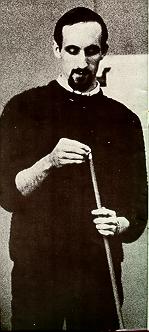 recital
at Cooper Union, and that was a real revelation. Sure, I'd seen Segovia,
but it never occurred to me that I could play a classical guitar.
At Cooper, I heard guys my own age who were amateurs but who played very
well. The next day I went out and traded my electric guitar and amplifier
for a good classical guitar. Then one night I went to The Commons, there
was a stage in place of the chess boards, so I walked up to the new manager
who was wearing blue jeans (rather "pushy" in my Brooks Brothers suit and
vest, something of a novelty in the Village in 1960) and I asked him if
he was looking for entertainers. He said sure, come try out. I did, and
began to play there regularly on weekends and then on weeknights, too.
Pretty soon I was dragging into the office late all the time. I knew I
had to decide which is was going to be. I decided to entertain. At The
Commons, I did songs and emceed and did sound effect imitations. It was
there that I met Mary. She came in one night with her hair in a pony tail;
the freshest, most beautiful thing that had ever walked through the door.
It wasn't "hip" to be too friendly and outgoing then, either: everybody
there was very busy being introspective and feeling sorry for themselves.
Soon after that, I went to Boston for two months to appear with Joan Baez.
When I came back, I played at the Cafe Wha on weekends and then moved to
the Gaslight where I saw Mary again. We began to do guest sets together.
The Peter met Mary and Mary introduced me to Peter, and soon the three
of us started to work up numbers. I knew Al Grossman, but I couldn't imagine
that all this was leading some place. He used to come to the Gaslight and
he had once asked me if I would be interested in working in a trio and
I had said no. Peter was the one who had the drive in the beginning and
is really responsible for getting things going. It was only after we'd
gone on the road that I began to hold up my end of things. before that,
I just didn't believe what was happening. Now I take care of the books,
a kind of financial wizard is what I am, the man with the dates and the
names. Musically, Peter and I have versatility and quite a range. We can
get a male quality in the high registers as well as the low, and my background
in country and western music adds something to Peter's classical &
folk training. But what really makes us different as a group is Mary. Lots
of guys have a wide range but to find a girl who has a feminine quality
in the low registers is very rare. She is the reason we're unique, and
I think she's the one who has a future in show business, perhaps as an
actress as well. Music for me is essentially communication. When I sing
to one or two girls in an audience and make them understand what I'm saying
and what I'm feeling, that's communication. I'd like to try films, too,
to reach more people; to make films, not to act in them. I think material
goals are short-sighted; you have to have a philosophical goal and communication
is just a means of reaching it. I'm not ashamed to say that my goal is
to save the world. So many troubles between people are only reflections
of troubles inside those same people. If we could only make our
thoughts and emotions understood by others, many conflicts could be avoided.
True communication of thought and emotion for all men is my goal. Music
is a way of achieving it. recital
at Cooper Union, and that was a real revelation. Sure, I'd seen Segovia,
but it never occurred to me that I could play a classical guitar.
At Cooper, I heard guys my own age who were amateurs but who played very
well. The next day I went out and traded my electric guitar and amplifier
for a good classical guitar. Then one night I went to The Commons, there
was a stage in place of the chess boards, so I walked up to the new manager
who was wearing blue jeans (rather "pushy" in my Brooks Brothers suit and
vest, something of a novelty in the Village in 1960) and I asked him if
he was looking for entertainers. He said sure, come try out. I did, and
began to play there regularly on weekends and then on weeknights, too.
Pretty soon I was dragging into the office late all the time. I knew I
had to decide which is was going to be. I decided to entertain. At The
Commons, I did songs and emceed and did sound effect imitations. It was
there that I met Mary. She came in one night with her hair in a pony tail;
the freshest, most beautiful thing that had ever walked through the door.
It wasn't "hip" to be too friendly and outgoing then, either: everybody
there was very busy being introspective and feeling sorry for themselves.
Soon after that, I went to Boston for two months to appear with Joan Baez.
When I came back, I played at the Cafe Wha on weekends and then moved to
the Gaslight where I saw Mary again. We began to do guest sets together.
The Peter met Mary and Mary introduced me to Peter, and soon the three
of us started to work up numbers. I knew Al Grossman, but I couldn't imagine
that all this was leading some place. He used to come to the Gaslight and
he had once asked me if I would be interested in working in a trio and
I had said no. Peter was the one who had the drive in the beginning and
is really responsible for getting things going. It was only after we'd
gone on the road that I began to hold up my end of things. before that,
I just didn't believe what was happening. Now I take care of the books,
a kind of financial wizard is what I am, the man with the dates and the
names. Musically, Peter and I have versatility and quite a range. We can
get a male quality in the high registers as well as the low, and my background
in country and western music adds something to Peter's classical &
folk training. But what really makes us different as a group is Mary. Lots
of guys have a wide range but to find a girl who has a feminine quality
in the low registers is very rare. She is the reason we're unique, and
I think she's the one who has a future in show business, perhaps as an
actress as well. Music for me is essentially communication. When I sing
to one or two girls in an audience and make them understand what I'm saying
and what I'm feeling, that's communication. I'd like to try films, too,
to reach more people; to make films, not to act in them. I think material
goals are short-sighted; you have to have a philosophical goal and communication
is just a means of reaching it. I'm not ashamed to say that my goal is
to save the world. So many troubles between people are only reflections
of troubles inside those same people. If we could only make our
thoughts and emotions understood by others, many conflicts could be avoided.
True communication of thought and emotion for all men is my goal. Music
is a way of achieving it.

Mary
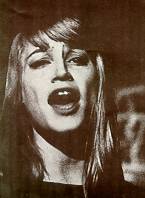 We
spend the greater part of our lives trying to share our experiences and feelings
with others. We want to tell people what we are about and let them know we
understand what they are about. Almost everything we do contributes to the
giving and receiving of this message. We communicate, not only in words, but in
how we treat each other, in the way we dress, move, work and live. For many of
us words have lost much of their meaning. We, who have inherited one of the
richest languages in the world, are using fewer and fewer words in our daily
lives. It is as though words have been used too often in the wrong places to
describe the wrong things. A child, a flower, a feeling can not all be evoked by
the same words used to describe a detergent. And so we sing. We sing to
ourselves when we are alone. We sing to each other or listen to music together
with the knowledge that the sharing of the sound is greater and deeper
communication than we may otherwise achieve. I know this is true for me. I could
tell you in words that I was born in Louisville, Kentucky and that my parents
brought me North a few days ahead of the great flood that destroyed their home
and hundreds of other homes and that I was raised in Greenwich Village and that
I had a rich and yet lonely childhood and that I love nature and everything in
nature - people, animals, flowers and fields, water and dusty roads and sunshine
and snow. But when I finished telling you all this I don't know whether I would
have communicated anything at all. Yet, in folk music I find a way of saying
everything I want to say. In the audience response I feel something more than
applause. I feel other people saying, "Yes, I understand'""Yes, I
feel that too." "Yes, that's what I want." Folk music and folk
history have been a part of my life always. My great- grandmother, who came out
of Illinois to be one of the first public school teachers in the state of
Arkansas, had seen the face of Lincoln. Her mother had gone on to make the great
trek West to Oregon. A multiple-great grandfather had been an officer with
Washington's army. I feel a sense of continuity with this history and with the
folk music that reflects it. I like to think when I am singing some of the early
American folk songs that members of my family sang these songs when they and the
events that evoked them were new. Folk music is a natural means of communication
for me. I come from a long line of non- conformists. The conformists were on the
losing side in 1776 and I doubt my great-great grandmother went to Oregon to
find a better bleach for her antimacassars. My mother and father are both
writers and although I come from what is so exquisitely described as a
"broken home," they were always united in presenting to me a rugged
distrust of "the establishment". The values I saw around me were
creative and human values. Friendship was more important than status. Ideas were
more important than things. I was surrounded by people who did things or were
trying to do things...artists, writers, people who were intense about life and
who wanted to affect the world they lived in. Like most young people I rebelled,
But even in my rebellion I never got very far away from these values and
attitudes. And yet I did not make the voyage through adolescence easily. I
attended a series of private progressive schools in New York City where I
distinguished myself by by refusing to conform to the standards of
non-conformism espoused We
spend the greater part of our lives trying to share our experiences and feelings
with others. We want to tell people what we are about and let them know we
understand what they are about. Almost everything we do contributes to the
giving and receiving of this message. We communicate, not only in words, but in
how we treat each other, in the way we dress, move, work and live. For many of
us words have lost much of their meaning. We, who have inherited one of the
richest languages in the world, are using fewer and fewer words in our daily
lives. It is as though words have been used too often in the wrong places to
describe the wrong things. A child, a flower, a feeling can not all be evoked by
the same words used to describe a detergent. And so we sing. We sing to
ourselves when we are alone. We sing to each other or listen to music together
with the knowledge that the sharing of the sound is greater and deeper
communication than we may otherwise achieve. I know this is true for me. I could
tell you in words that I was born in Louisville, Kentucky and that my parents
brought me North a few days ahead of the great flood that destroyed their home
and hundreds of other homes and that I was raised in Greenwich Village and that
I had a rich and yet lonely childhood and that I love nature and everything in
nature - people, animals, flowers and fields, water and dusty roads and sunshine
and snow. But when I finished telling you all this I don't know whether I would
have communicated anything at all. Yet, in folk music I find a way of saying
everything I want to say. In the audience response I feel something more than
applause. I feel other people saying, "Yes, I understand'""Yes, I
feel that too." "Yes, that's what I want." Folk music and folk
history have been a part of my life always. My great- grandmother, who came out
of Illinois to be one of the first public school teachers in the state of
Arkansas, had seen the face of Lincoln. Her mother had gone on to make the great
trek West to Oregon. A multiple-great grandfather had been an officer with
Washington's army. I feel a sense of continuity with this history and with the
folk music that reflects it. I like to think when I am singing some of the early
American folk songs that members of my family sang these songs when they and the
events that evoked them were new. Folk music is a natural means of communication
for me. I come from a long line of non- conformists. The conformists were on the
losing side in 1776 and I doubt my great-great grandmother went to Oregon to
find a better bleach for her antimacassars. My mother and father are both
writers and although I come from what is so exquisitely described as a
"broken home," they were always united in presenting to me a rugged
distrust of "the establishment". The values I saw around me were
creative and human values. Friendship was more important than status. Ideas were
more important than things. I was surrounded by people who did things or were
trying to do things...artists, writers, people who were intense about life and
who wanted to affect the world they lived in. Like most young people I rebelled,
But even in my rebellion I never got very far away from these values and
attitudes. And yet I did not make the voyage through adolescence easily. I
attended a series of private progressive schools in New York City where I
distinguished myself by by refusing to conform to the standards of
non-conformism espoused 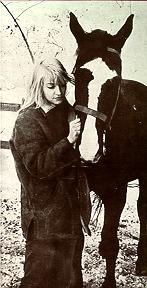 by
each of them. Unable to be like everybody else, I was equally unable to be
myself. I didn't know who that self was. I'm still learning. I wanted to have
and be everything - and nothing. I painted. I sang. I wrote poetry. I read. I
daydreamed victories I dared not even begin to attempt. I was lonely, distracted
an afraid. I married. Not the least of the reasons it didn't work was that we
were both too young in too many ways. Still, for me, this experience proved the
source of something beautiful. I have a daughter, Erica, now three-and-a-half.
She is to be sung, not talked about. All of this time I was involved in folk
music. I had never planned to be a performer. My one professional experience, in
a Mort Sahl show, convinced me easily that the theatre was not for me. Still,
folk music was pat of my life. My mother and I lived in and old "falling
down house" in Greenwich Village. Pete Seeger used our basement for
rehearsals. I sang in the chorus at an occasional concert. Leadbelly's niece,
Tiny, lived not far away. I haunted that house where on an ordinary evening I
might find Brownie McGee, Sonny Terry, the Rev. Gary Davis, or Alex McEwan.
Charity Bailey had taught music at the Little Red School House when I was a
reluctant student there. At the Elizabeth Irwin High School I listened and
learned from Bob de Cormier. Folk music was very much a part of my life at home.
When my mother married again - a French doctor who was a director of the World
Health Organization, I inherited a non-English speaking sister, Frederique and a
brother Joel. Together with my own younger sister, Ann, folk music became a
means of communication - a substitute for spoken language. We played and sang
for a steady stream of diplomats from all over the world who now became a part
of our daily lives. Our visiting dignitaries joined in choruses and added their
own folk music to our repertoire. Meanwhile like many other young people raised
in Greenwich Village, I gravitated toward the Washington Square Park folk-sings
and the neighborhood coffee shops featuring equal parts folk music, chess and
the talking artists. I think a word about the "real" Greenwich Village
is in order here. To me and to all those for whom the Village is home, the
section below 14th Street in Manhattan bears no resemblance to the area gawked
at by thrill- seeking tourists. The Village was for me exactly that - a village,
a small community where everybody knew everybody else and helped everybody else
and cared about everybody else. It wasn't then and it isn't now all sweetness
and light. Neither is any small town anywhere. although everyone I knew was busy
doing something or getting ready to do something, it never occurred to me that I
might ever "do anything" with music. I thought vaguely of acting. I
continued to write. I painted numerous interpretations of the alley view from my
apartment window. After my marriage and especially after Erica's birth even
these vague stirrings died out completely. I sang primarily to Erica and what
artistic drives I may have had found their expression in reading other people's
words, looking at other people's paintings and moving furniture about to make
the two rooms in the apartment do the work of three. It was not until after my
marriage had ended that the idea of becoming a performer actually took hold in
my head. I had met Paul in The Commons and we were doing occasional guest sets
together at The Gaslight. Al Grossman, who was later to become our manager,
introduced me to Peter and I introduced him to Paul. Soon the three of us were
working up numbers together. When Al took us under his generous wing, I suppose
he and Peter and Paul expected something to come of it all. I didn't. I think I
really went along for the friendship, the sense of belonging, the to me,
startling discovery, that work could be it's own end. I can't write about Peter
and Paul and what Al has done for me - for us - without an intensity of feeling
that stops the words before they come. They have given me myself. They have made
the improbable, possible. Peter and Paul are - Peter and Paul. If you knew them
as I do you would not need to know any more. They are, for me, what all the
music is about: integrity, and love and the reality of feeling. That is what
they have helped me find in myself and thus in the world about me. It is this
vision that we share with you in our music and if it has proved to be
successful, it is not, I believe, because it is our vision, but because it has
been yours all along. by
each of them. Unable to be like everybody else, I was equally unable to be
myself. I didn't know who that self was. I'm still learning. I wanted to have
and be everything - and nothing. I painted. I sang. I wrote poetry. I read. I
daydreamed victories I dared not even begin to attempt. I was lonely, distracted
an afraid. I married. Not the least of the reasons it didn't work was that we
were both too young in too many ways. Still, for me, this experience proved the
source of something beautiful. I have a daughter, Erica, now three-and-a-half.
She is to be sung, not talked about. All of this time I was involved in folk
music. I had never planned to be a performer. My one professional experience, in
a Mort Sahl show, convinced me easily that the theatre was not for me. Still,
folk music was pat of my life. My mother and I lived in and old "falling
down house" in Greenwich Village. Pete Seeger used our basement for
rehearsals. I sang in the chorus at an occasional concert. Leadbelly's niece,
Tiny, lived not far away. I haunted that house where on an ordinary evening I
might find Brownie McGee, Sonny Terry, the Rev. Gary Davis, or Alex McEwan.
Charity Bailey had taught music at the Little Red School House when I was a
reluctant student there. At the Elizabeth Irwin High School I listened and
learned from Bob de Cormier. Folk music was very much a part of my life at home.
When my mother married again - a French doctor who was a director of the World
Health Organization, I inherited a non-English speaking sister, Frederique and a
brother Joel. Together with my own younger sister, Ann, folk music became a
means of communication - a substitute for spoken language. We played and sang
for a steady stream of diplomats from all over the world who now became a part
of our daily lives. Our visiting dignitaries joined in choruses and added their
own folk music to our repertoire. Meanwhile like many other young people raised
in Greenwich Village, I gravitated toward the Washington Square Park folk-sings
and the neighborhood coffee shops featuring equal parts folk music, chess and
the talking artists. I think a word about the "real" Greenwich Village
is in order here. To me and to all those for whom the Village is home, the
section below 14th Street in Manhattan bears no resemblance to the area gawked
at by thrill- seeking tourists. The Village was for me exactly that - a village,
a small community where everybody knew everybody else and helped everybody else
and cared about everybody else. It wasn't then and it isn't now all sweetness
and light. Neither is any small town anywhere. although everyone I knew was busy
doing something or getting ready to do something, it never occurred to me that I
might ever "do anything" with music. I thought vaguely of acting. I
continued to write. I painted numerous interpretations of the alley view from my
apartment window. After my marriage and especially after Erica's birth even
these vague stirrings died out completely. I sang primarily to Erica and what
artistic drives I may have had found their expression in reading other people's
words, looking at other people's paintings and moving furniture about to make
the two rooms in the apartment do the work of three. It was not until after my
marriage had ended that the idea of becoming a performer actually took hold in
my head. I had met Paul in The Commons and we were doing occasional guest sets
together at The Gaslight. Al Grossman, who was later to become our manager,
introduced me to Peter and I introduced him to Paul. Soon the three of us were
working up numbers together. When Al took us under his generous wing, I suppose
he and Peter and Paul expected something to come of it all. I didn't. I think I
really went along for the friendship, the sense of belonging, the to me,
startling discovery, that work could be it's own end. I can't write about Peter
and Paul and what Al has done for me - for us - without an intensity of feeling
that stops the words before they come. They have given me myself. They have made
the improbable, possible. Peter and Paul are - Peter and Paul. If you knew them
as I do you would not need to know any more. They are, for me, what all the
music is about: integrity, and love and the reality of feeling. That is what
they have helped me find in myself and thus in the world about me. It is this
vision that we share with you in our music and if it has proved to be
successful, it is not, I believe, because it is our vision, but because it has
been yours all along.
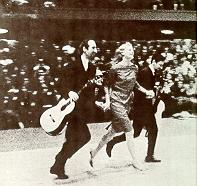

Photographs by: Barry Feinstein
Designed by: Push Pin Studios
|